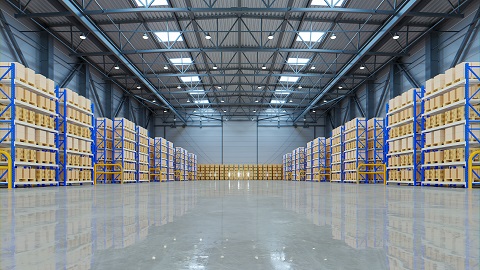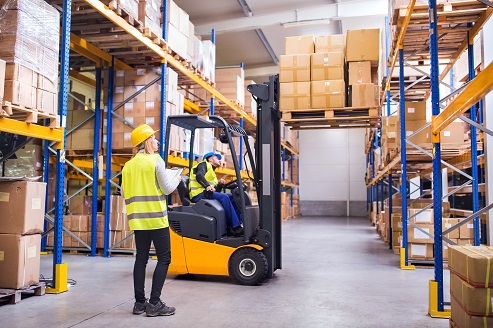
In today's dynamic business landscape, effective warehousing has become indispensable for businesses of all sizes. It provides a secure and organized space to store goods, ensuring smooth operations and customer satisfaction. Let's dive deeper into the world of warehousing and discover its significance.
Warehousing refers to the process of storing goods in a designated facility before they are sold, distributed, or transported to their final destination. It involves the safekeeping of products, managing inventory levels, and ensuring their availability as per demand.
Warehousing is a crucial element in the supply chain ecosystem. It offers several benefits that contribute to the overall success of businesses:
Optimized Inventory Management: Warehouses enable businesses to maintain optimal inventory levels by strategically storing goods. This helps minimize stockouts and excess inventory, resulting in cost savings and improved efficiency.
Streamlined Order Fulfillment: Warehouses facilitate efficient order processing, picking, and packing operations. They ensure that products are readily available, allowing businesses to fulfill customer orders promptly and enhance customer satisfaction.
Product Quality Maintenance: Warehouses provide controlled environments that help preserve the quality and condition of products. This is particularly important for goods that are sensitive to factors such as temperature, humidity, or handling.
Warehouses can be classified into different types based on their ownership and usage. Let's explore the three main categories:
Private warehouses are owned and operated by individual companies to store their own goods exclusively. They offer greater control and flexibility over inventory management and security. Private warehouses are commonly used by large enterprises with significant storage requirements.
Public warehouses are third-party facilities that offer storage services to multiple businesses. These warehouses charge rent or fees for their services and provide shared storage space to various companies. Public warehouses are ideal for small to medium-sized businesses that require cost-effective storage solutions without long-term commitments.
Bonded warehouses are specialized facilities authorized by customs authorities to store imported goods. These warehouses enable businesses to delay the payment of customs duties until the products are sold or transported to another location. Bonded warehouses are beneficial for importers and exporters dealing with international trade.
Warehouses serve various functions that are essential for efficient supply chain management. Let's explore the key functions of warehousing:
The primary function of warehousing is to provide adequate storage space for goods. Warehouses have shelves, racks, and storage systems that are designed to accommodate different types of products based on their size, shape, and nature.

Warehouses play a vital role in managing inventory levels. They track stock movement, conduct regular stock audits, and ensure the availability of products when needed. Effective inventory management minimizes stockouts, prevents overstocking, and contributes to cost savings.
Warehouses facilitate the efficient picking, packing, and shipping of products. They organize inventory in a way that enables quick access to items, ensuring smooth order fulfillment processes. This helps businesses meet customer demands promptly and efficiently.
Warehouses often handle packaging services and labeling activities to prepare products for shipment. This includes packaging products in appropriate containers, applying labels with product information and barcodes, and ensuring compliance with shipping regulations.
Warehouses serve as strategic hubs for transportation. They coordinate the movement of goods between suppliers, manufacturers, distributors, and retailers. Warehouses enable efficient consolidation and distribution of products, reducing transportation costs and transit times.
Warehousing offers numerous benefits that contribute to the success of businesses. Let's explore some of the key advantages:
Efficient warehousing helps businesses reduce costs associated with storage, inventory management, order fulfillment, and transportation. By optimizing these processes, businesses can minimize expenses and achieve better financial performance.
Well-organized warehouses streamline operations, enabling businesses to achieve higher efficiency levels. With proper inventory management, order fulfillment, and transportation, businesses can enhance productivity and meet customer demands effectively.
Warehousing plays a vital role in ensuring customer satisfaction. By maintaining optimal inventory levels, fulfilling orders promptly, and delivering products in good condition, businesses can meet customer expectations and build strong relationships.
Technological advancements have transformed the warehousing industry, introducing innovative solutions for improved efficiency and accuracy. Let's explore some of the key technologies used in modern warehousing:
Warehouse Management Systems are software applications that facilitate efficient management of warehouse operations. They automate inventory tracking, order processing, and data analysis, enabling businesses to optimize their warehousing processes.
Robotic systems and automation technologies are increasingly being adopted in warehouses. These technologies automate repetitive tasks such as picking, packing, and sorting, reducing manual labor, minimizing errors, and enhancing productivity.
RFID (Radio Frequency Identification) and barcode technologies are used for efficient inventory tracking and product identification. They enable real-time data capture, ensuring accurate stock management, and improving order fulfillment processes.
While warehousing offers significant benefits, it also comes with challenges. Let's explore some of the common challenges faced by businesses in the field of warehousing:
Limited warehouse space can pose challenges in storing a diverse range of products. It becomes crucial for businesses to optimize storage layouts, utilize vertical space, and adopt space-saving storage systems to maximize capacity.
Maintaining accurate inventory records and minimizing discrepancies can be challenging. It requires effective inventory tracking systems, regular stock audits, and stringent quality control measures to ensure accurate stock levels and prevent stockouts or overstocking.
Managing warehouse personnel and ensuring efficient workforce utilization can be complex. Businesses need to focus on training, scheduling, and task allocation to maintain productivity and ensure a skilled and motivated workforce.
The warehousing industry is continually evolving, driven by changing market dynamics and technological advancements. Let's explore some of the current trends shaping the field of warehousing:
The rise of e-commerce has transformed the warehousing landscape. With the increasing demand for online shopping, warehouses are adapting to handle higher order volumes, implement faster order processing, and enable efficient last-mile delivery.
Sustainability is gaining prominence in the warehousing industry. Businesses are adopting eco-friendly practices such as energy-efficient lighting, waste reduction, and green packaging solutions to minimize their environmental impact.
Efficient last-mile delivery has become a critical focus area for warehouses. With the growing demand for quick and reliable delivery, warehouses are exploring innovative solutions such as drone delivery, autonomous vehicles, and strategically located urban fulfillment centers.
The future of warehousing holds exciting possibilities. Technological advancements such as artificial intelligence, Internet of Things (IoT), and predictive analytics will continue to revolutionize the industry. Warehouses will become smarter, more efficient, and capable of handling larger volumes with increased accuracy.
Warehousing is an integral part of the supply chain ecosystem, offering significant advantages to businesses. It ensures efficient storage, inventory management, order fulfillment, and transportation, contributing to cost savings, improved efficiency, and customer satisfaction. Embracing technological advancements and adapting to evolving trends will be crucial for businesses to stay competitive in the dynamic world of warehousing.
What is the purpose of warehousing?
Warehousing serves the purpose of storing goods, managing inventory, facilitating order fulfillment, and coordinating transportation to ensure smooth operations and customer satisfaction.
How do warehouses help in cost savings?
Warehouses contribute to cost savings by optimizing inventory levels, minimizing stockouts and excess inventory, streamlining order fulfillment processes, and reducing transportation costs.
What technologies are used in modern warehousing?
Modern warehousing utilizes technologies such as Warehouse Management Systems (WMS), robotics, automation, RFID, and barcode technology to enhance efficiency and accuracy in operations.
What are the challenges in warehousing?
Common challenges in warehousing include space constraints, inventory control, and effective workforce management.
What are the future trends in warehousing?
Future trends in warehousing include the e-commerce boom, sustainable warehousing practices, and the focus on efficient last-mile delivery using advanced technologies like drones and autonomous vehicles.
Looking for reliable warehousing services to streamline your supply chain? Look no further than PGA Shipping Services! With our extensive partnerships with large warehousing services around the world, we ensure that your goods are stored securely and efficiently. Our global network of warehouses enables us to offer seamless storage solutions tailored to your business needs. Maximize your operational efficiency and enhance customer satisfaction with PGA Shipping Services. Contact us today to learn more and take your warehousing to the next level.